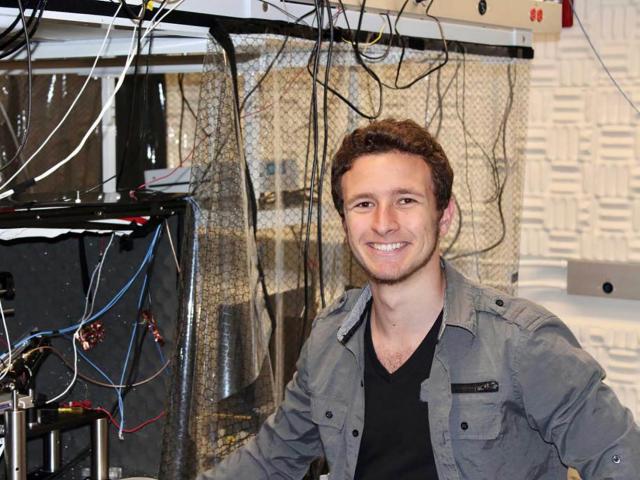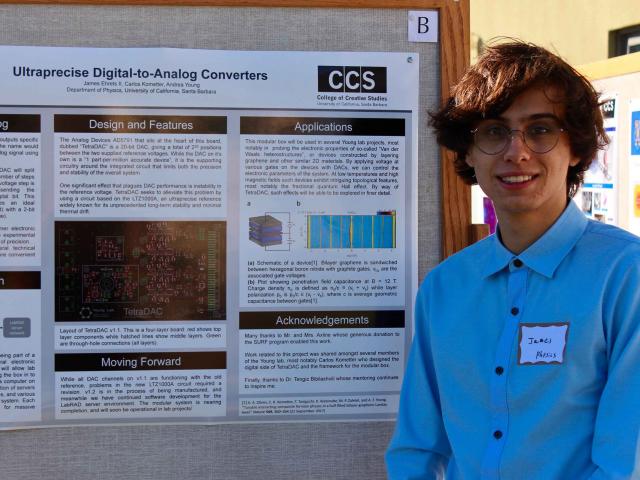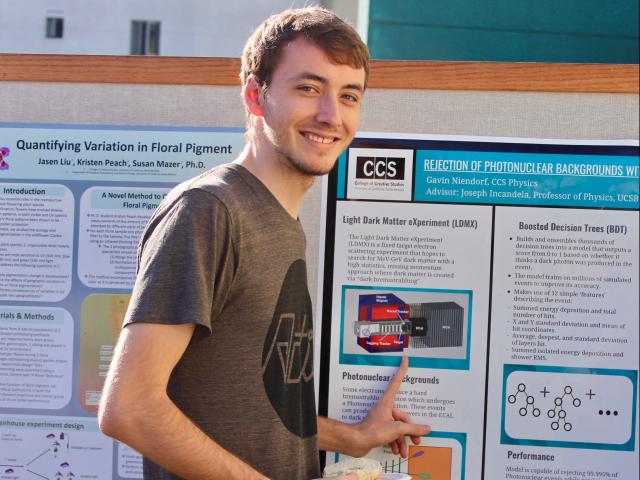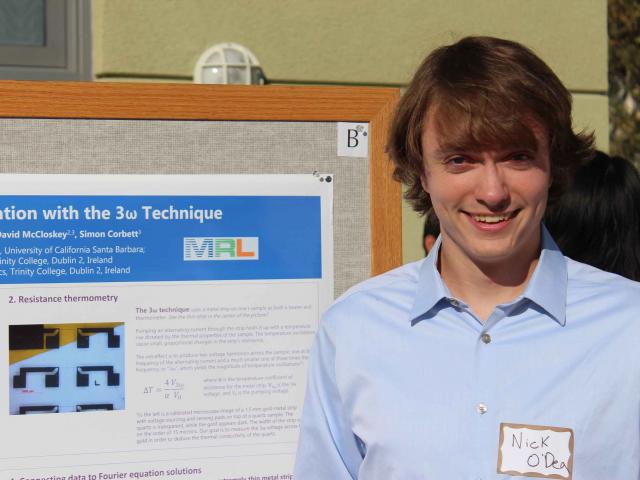Research Pairs
Four CCS Physicists selected to receive 2018 Worster Award

The College of Creative Studies (CCS) congratulates four CCS Physicists selected for 2018 Worster Summer Research Fellowships. Supported by philanthropic gifts from the Worster family, the Worster Award facilitates the development of graduate and undergraduate research in Physics through a mentoring program that pairs an undergraduate with a graduate student mentor during the summer. CCS awardees Dolev Bluvstein, James Ehrets, Gavin Niendorf, and Nick O'Dea will dedicate their summer to research in some of UC Santa Barbara’s top Physics labs.
"This is the second year I was involved in selecting the awardees, and once again I was impressed by the high quality of the applications. It was tough just selecting 6 teams for the award," said Sathya Guruswamy, the CCS Physics Program Coordinator and Worster Committee member. "My colleague Andrew Jayich and I will be meeting this year's Worster teams throughout the summer as they update us on the progress of their work, and practice their presentations for the Worster Symposium in the Fall."

Bluvstein, who is matched with Zhiran Zhang, will be working on developing the nitrogen-vacancy center in diamond as a new microscopy tool in Dr. Ania Jayich's lab. "The ultimate goal of my project is to achieve spatially resolved nuclear magnetic resonance at the single-atom limit," explained Bluvstein. "This would then allow for methodical imaging of the structure of proteins and other molecules, which would have far-reaching implications in structural biology." Bluvstein's goal is to attend graduate school and dedicate his career to Physics research. The Worster Award will help him achieve this goal.
Ehrets has spent the past two years designing electronics for experiments in Dr. Andrea Young’s lab. This summer he will shift his focus to characterizing and exploring the properties of ABC-stacked trilayer graphene with Haoxin Zhou. The third-year student credits CCS for providing him the tools to conduct high-caliber research. “CCS has provided me the opportunity to learn a tremendous amount of physics in the first two years of courses,” said Ehrets, “which acted as a great springboard into upper division classes and research.”

Niendorf will research Compact Muon Solenoid (CMS) analysis, using real data from the Large Hadron Collider, with his graduate mentor, Giulia Collura, in Dr. Joseph Incandela’s lab. Niendorf and Collura have previously collaborated on the Light Dark Matter eXperiment (LMDX), a small-scale accelerator experiment spearheaded by a group at Stanford. “This summer I hope to use the skills I have learned while working on LDMX and apply them to a CMS analysis (using real data from the Large Hadron Collider),” said Niendorf. “Working on a CMS analysis will give me the skills I need to succeed in graduate school, so I'm thankful for this opportunity.”
O'Dea, who has been paired with graduate student Joshua Straub, will devote his summer to Dr. Matthew Fisher's Quantum Brain project. Under the supervision of their faculty advisors, CCS students are often encouraged to challenge themselves by taking graduate-level courses. O'Dea met Fisher and Straub while taking two graduate-level quantum mechanics courses. "I'm looking forward to working with them," exclaimed O'Dea. Together with Straub, O'Dea will experimentally determine the existence of Posner clusters, which are a nuclear spin state of phosphorus atoms within a calcium phosphate compound that Fisher proposes is responsible for quantum computation in the brain. Additionally, they will estimate the cluster's concentration in body fluids and investigate the quantum correlations in chemical reactions.

"Research is not on the list of graduation requirement but is an important component of a good college education for those who are going to continue their study after graduation," said Tengiz Bibilashvili, a CCS Physics faculty member. "All CCS physics majors are involved in research, but Worster Summer Research Fellowship helps them to become a part of a team with a professor and graduate student. In addition to the teamwork, Worster fellows meet physics faculty who teach them how to make a good presentation at Worster symposium."
After the conclusion of the summer, in fall 2018, each of the Worster Award recipients will present their research at the annual Worster Symposium. These presentations will convey results of their research--a vital step to any scientific activity--and will inspire future Worster awardees. "For the past few years I have attended the Worster symposium in the fall, and I was always impressed by the quality of the talks," said Ehrets. "Now that I've been honored with this same opportunity, I hope to work hard over the summer to reach this caliber. This is admittedly a bit daunting, but I am very excited about this project, and I anticipate that we will find some interesting results to share!"